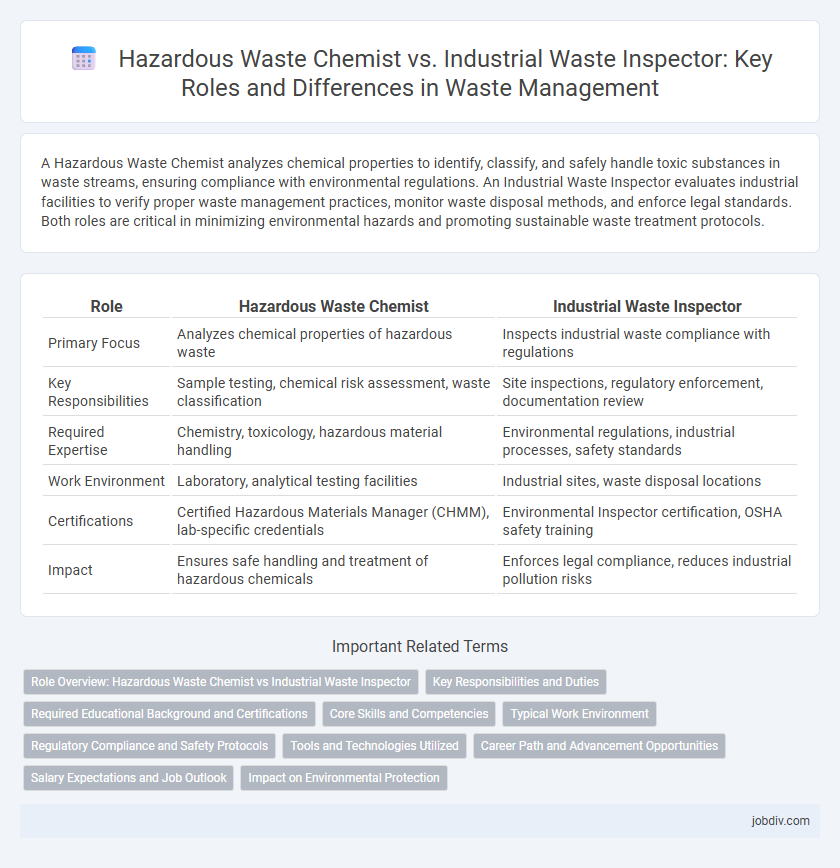A Hazardous Waste Chemist analyzes chemical properties to identify, classify, and safely handle toxic substances in waste streams, ensuring compliance with environmental regulations. An Industrial Waste Inspector evaluates industrial facilities to verify proper waste management practices, monitor waste disposal methods, and enforce legal standards. Both roles are critical in minimizing environmental hazards and promoting sustainable waste treatment protocols.
Table of Comparison
| Role | Hazardous Waste Chemist | Industrial Waste Inspector |
|---|---|---|
| Primary Focus | Analyzes chemical properties of hazardous waste | Inspects industrial waste compliance with regulations |
| Key Responsibilities | Sample testing, chemical risk assessment, waste classification | Site inspections, regulatory enforcement, documentation review |
| Required Expertise | Chemistry, toxicology, hazardous material handling | Environmental regulations, industrial processes, safety standards |
| Work Environment | Laboratory, analytical testing facilities | Industrial sites, waste disposal locations |
| Certifications | Certified Hazardous Materials Manager (CHMM), lab-specific credentials | Environmental Inspector certification, OSHA safety training |
| Impact | Ensures safe handling and treatment of hazardous chemicals | Enforces legal compliance, reduces industrial pollution risks |
Role Overview: Hazardous Waste Chemist vs Industrial Waste Inspector
A Hazardous Waste Chemist analyzes chemical compositions and toxicity levels of hazardous wastes to ensure proper handling and compliance with environmental regulations. An Industrial Waste Inspector evaluates waste disposal processes at industrial sites, verifying adherence to safety standards and preventing environmental contamination. Both roles are critical for effective hazardous waste management but differ in focus, with chemists centered on chemical analysis and inspectors on regulatory enforcement.
Key Responsibilities and Duties
A Hazardous Waste Chemist analyzes chemical properties and toxicity levels of waste materials, ensuring compliance with environmental regulations through precise laboratory testing and risk assessment. An Industrial Waste Inspector monitors industrial waste disposal practices, inspects sites for regulatory adherence, and enforces proper handling and containment procedures to prevent contamination. Both roles are critical in managing waste safety, but the chemist focuses on chemical analysis while the inspector emphasizes field inspections and regulatory compliance enforcement.
Required Educational Background and Certifications
A Hazardous Waste Chemist typically requires a degree in chemistry, environmental science, or a related field, along with certifications such as Hazardous Waste Operations and Emergency Response (HAZWOPER). An Industrial Waste Inspector often holds a background in environmental engineering, industrial hygiene, or environmental science, supplemented by certifications like Certified Hazardous Materials Manager (CHMM) or state-specific waste management licenses. Both roles demand expertise in regulatory compliance, but the chemist focuses on chemical analysis while the inspector emphasizes site inspections and waste handling procedures.
Core Skills and Competencies
Hazardous Waste Chemists specialize in analyzing chemical properties and toxicity of hazardous materials, requiring expertise in chemical analysis techniques, laboratory safety protocols, and regulatory compliance with agencies like the EPA. Industrial Waste Inspectors focus on monitoring waste management practices at industrial sites, emphasizing skills in environmental regulations, site inspection, waste sampling, and identifying non-compliance issues. Both roles demand strong knowledge of environmental laws and waste handling procedures, but chemists concentrate on chemical characterization while inspectors prioritize field assessments and regulatory enforcement.
Typical Work Environment
A Hazardous Waste Chemist typically operates in controlled laboratory settings, analyzing chemical properties and toxicity levels of hazardous materials to ensure safe disposal and regulatory compliance. In contrast, an Industrial Waste Inspector works primarily on-site at factories, manufacturing plants, or waste management facilities, conducting inspections to verify adherence to environmental regulations and proper handling of industrial waste. Both roles require adherence to stringent safety protocols, but the chemist's environment is more lab-oriented while the inspector's role involves extensive fieldwork and site assessments.
Regulatory Compliance and Safety Protocols
Hazardous waste chemists specialize in analyzing chemical compositions to ensure materials meet Environmental Protection Agency (EPA) regulations, focusing on identifying toxic substances and proper labeling to prevent contamination. Industrial waste inspectors enforce compliance with Occupational Safety and Health Administration (OSHA) standards and Resource Conservation and Recovery Act (RCRA) guidelines by conducting site inspections and verifying waste management procedures. Both roles collaborate to uphold safety protocols that minimize environmental hazards and promote public health through stringent monitoring and regulatory adherence.
Tools and Technologies Utilized
Hazardous waste chemists utilize advanced analytical instruments such as gas chromatographs, mass spectrometers, and atomic absorption spectrometers to identify and quantify toxic substances in waste samples. Industrial waste inspectors rely on handheld detection devices, remote sensing technologies, and environmental monitoring systems to assess compliance with regulatory standards and detect hazardous material leaks or illegal dumping. Both roles integrate software platforms for data analysis and reporting, enhancing accuracy and efficiency in waste management processes.
Career Path and Advancement Opportunities
Hazardous waste chemists specialize in analyzing and managing toxic materials, requiring advanced knowledge in chemistry and environmental regulations, with career advancement often leading to senior scientist or environmental consultant roles. Industrial waste inspectors focus on ensuring compliance with waste disposal laws and operational standards within factories, progressing toward supervisory or regulatory positions. Both careers offer growth through certifications and experience, but hazardous waste chemists typically advance through technical expertise, while industrial waste inspectors leverage regulatory skills and field experience.
Salary Expectations and Job Outlook
Hazardous waste chemists typically earn a median salary ranging from $65,000 to $90,000 annually, driven by expertise in chemical analysis and regulatory compliance. Industrial waste inspectors command salaries between $50,000 and $75,000, reflecting their role in monitoring waste management practices and enforcing environmental regulations. Job outlooks for both professions are positive, with increasing demand for waste management due to tightening environmental laws and growing industrial activities.
Impact on Environmental Protection
A Hazardous Waste Chemist analyzes chemical compositions to identify toxic substances and develop safer disposal methods, directly reducing environmental contamination risks. An Industrial Waste Inspector enforces regulatory compliance by monitoring waste management practices in facilities, ensuring adherence to environmental protection laws. Both roles collaboratively mitigate pollution, but the chemist's scientific expertise underpins safer waste treatment, while the inspector ensures practical application of environmental safeguards.
Hazardous Waste Chemist vs Industrial Waste Inspector Infographic

 jobdiv.com
jobdiv.com